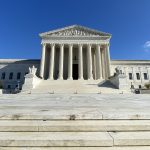Justices again side with Biden on ghost guns

Share
Less than three months after allowing the Biden administration to temporarily reinstate a rule by the Bureau of Alcohol, Tobacco, Firearms, and Explosives regulating “ghost guns,” the Supreme Court blocked a ruling by a federal judge in Texas that would have prevented the government from enforcing the rule against two manufacturers of gun parts. Appealing to the justices to act, U.S. Solicitor General Elizabeth Prelogar had urged the court not to “tolerate such circumvention of its orders.”
Ghost guns are firearms without serial numbers that virtually anyone can assemble from parts, often purchased in a kit. In 2022, the ATF issued a rule to make clear that federal laws governing the sale of firearms – requiring, for example, background checks for purchases and imposing recordkeeping obligations – apply to ghost guns.
On June 30, U.S. District Judge Reed O’Connor barred ATF from enforcing the rule anywhere in the United States. The U.S. Court of Appeals for the 5th Circuit narrowed the scope of O’Connor’s order but declined to put it on hold while the government appealed. That prompted Prelogar to come to the Supreme Court in July, telling the justices that O’Connor’s order was “irreparably harming the public and the government by reopening the floodgates to the tide of untraceable ghost guns flowing into our Nation’s communities.”
By a vote of 5-4, the Supreme Court on Aug. 8 granted the government’s request to be able to enforce the rule while litigation continued in the lower courts. Justices Clarence Thomas, Samuel Alito, Neil Gorsuch, and Brett Kavanaugh indicated that they would have allowed the ban on enforcement of the rule to continue.
Shortly after the Supreme Court’s Aug. 8 order, two of the original challengers – Blackhawk Manufacturing and Defense Distributed – returned to the district court, seeking an injunction that would bar the government from enforcing the rule against them while the appeal continued. O’Connor granted that request on Sept. 14, and the 5th Circuit upheld O’Connor’s order on Oct. 2.
The Biden administration returned to the Supreme Court three days later, asking the justices to intervene again. The Supreme Court’s Aug. 8 order, Prelogar wrote, “reflects an authoritative determination that the government should be allowed to implement the Rule during appellate proceedings.” If the Supreme Court does not block O’Connor’s order, Prelogar warned, “untraceable ghost guns will remain widely available to anyone with a computer and a credit card – no background check required.” And more broadly, she added, the court should step in because the lower courts “have effectively countermanded this Court’s authoritative determination” that the Biden administration should be able to enforce the rule nationwide while its appeal continues.
Defense Distributed countered that O’Connor’s Sept. 14 order provided a different remedy than his June 30 order: While the earlier order vacated the rule, so that it effectively did not exist anywhere in the country, O’Connor’s Sept. 14 order simply barred the government from enforcing the rule against Blackhawk and Defense Distributed.
In light of this difference, Blackhawk emphasized, the company had no choice but to go back to the district court to seek relief “to preserve its ability to stay in business” until the litigation is concluded.
On Oct. 6, Justice Samuel Alito, who handles emergency appeals from the 5th Circuit, issued a temporary stay of O’Connor’s ruling, until 5 p.m. on Oct. 16, to give the Supreme Court time to consider the Biden administration’s request. In a brief, unsigned order issued shortly before 4:30 p.m. on Monday, the justices vacated O’Connor’s order, clearing the way for the Biden administration to enforce the rule against Blackhawk and Defense Distributed for now. There were no public dissents from the court’s order.
This article was originally published at Howe on the Court.
The post Justices again side with Biden on ghost guns appeared first on SCOTUSblog.
